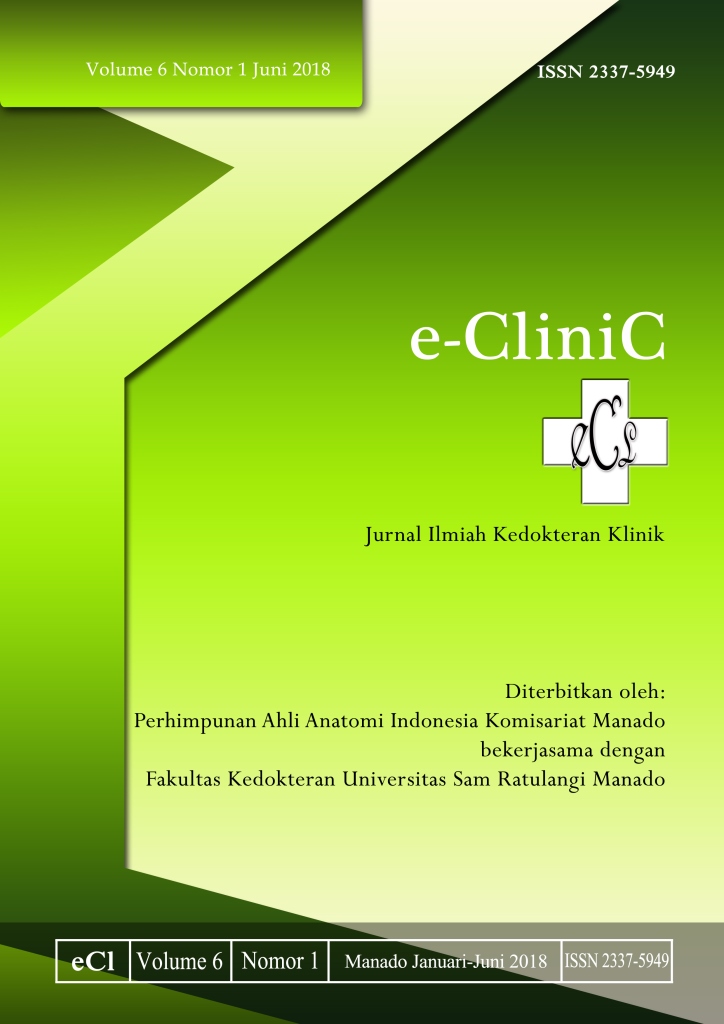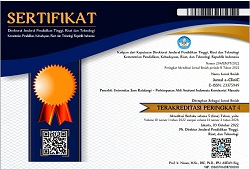Gambaran Mental Emosional pada Orang Tua yang Anaknya dirawat di Instalasi Gawat Darurat RSUP Prof. Dr. R. D. Kandou Manado
DOI:
https://doi.org/10.35790/ecl.v6i1.18635Abstract
Abstract: Emotional mental disorder is a condition that indicates psychological changes in an individual. This disorder can manifest as symptoms of depression, psychosomatic disorders, and anxiety. Having a child hospitalized for a life-threatening illness or injury can cause deep psychological reactions to the parents. This study was aimed to determine the mental emotional profile among the parents whose children were treated at the Emergency Installation of Prof. Dr. R. D. Kandou Hospital from October to November 2017. This was a quantitative descriptive study with a cross sectional design. This study involved all parents whose children were treated in the emergency installation who met the inclusion criteria as many as 72 respondents. The instruments of the study were Self Reporting Questionnaire (SRQ) and Depression Anxiety Stress Scale (DASS). Univariate and bivariate analyzes were performed using SPSS. Based on SRQ and DASS questionnaire data filled by 72 respondents, 54 parents (75%) had emotional mental disorders, consisting of 49 parents (68.1%) suffering from anxiety from mild to very severe and 18 parents (25 %) suffering from mild to very severe depression. The most dominant diseases of the children that caused anxiety to the parents were diarrhea, bronchopneumonia, and febrile seizures. Conclusion: The conditions of children treated in the Emergency Installation of Prof. Dr. R. D. Kandou Hospital could cause psychological stress in the form of anxiety and depression for the parents.
Keywords: emotional mental disorders, anxiety, depression, parents
Abstrak: Gangguan mental emosional adalah kondisi yang mengindikasikan perubahan psikologik pada seseorang. Gangguan mental emosional dapat berupa gejala depresi, gangguan psikosomatik, dan kecemasan. Pengalaman memiliki anak yang dirawat di rumah sakit karena penyakit atau cedera yang mengancam jiwa dapat menyebabkan reaksi psikologik yang mendalam pada orang tua. Penelitian ini bertujuan untuk mengetahui gambaran mental emosional pada orang tua yang anaknya dirawat di IGD RSUP Prof. Dr. R. D. Kandou periode Oktober-November 2017. Jenis penelitian ialah deskriptif kuantitatif dengan studi potong lintang. Penelitian ini melibatkan semua orang tua yang anaknya dirawat di IGD dan memenuhi kriteria inklusi yaitu 72 responden orang tua. Instrumen yang digunakan ialah kuesioner Self Reporting Qustionnaire (SRQ) dan Depression Anxiety Stress Scale (DASS). Analisis univariat dan bivariat dilakukan dengan menggunakan SPSS. Berdasarkan perolehan data kuesioner SRQ dan DASS dari 72 responden, 54 orang tua (75%) mengalami gangguan mental emosional, yang terdiri dari 49 orang tua (68,1%) dengan kecemasan dari ringan hingga sangat berat dan 18 orang tua (25%) dengan depresi ringan hingga sangat berat. Dari penelitian ini didapatkan diagnosis penyakit anak yang paling dominan menye-babkan kecemasan dan depresi pada orang tua, yaitu diare, bronkopneumonia, dan kejang demam. Simpulan: Kondisi anak yang dirawat di Instalasi Gawat Darurat RSUP Prof. Dr. R. D. Kandou dapat menimbulkan stres psikologik berupa kecemasan dan depresi pada orang tua.
Kata kunci: gangguan mental emosional, kecemasan, depresi, orang tua
Downloads
Published
How to Cite
Issue
Section
License
COPYRIGHT
Authors who publish with this journal agree to the following terms:
Authors hold their copyright and grant this journal the privilege of first publication, with the work simultaneously licensed under a Creative Commons Attribution License that permits others to impart the work with an acknowledgment of the work's origin and initial publication by this journal.
Authors can enter into separate or additional contractual arrangements for the non-exclusive distribution of the journal's published version of the work (for example, post it to an institutional repository or publish it in a book), with an acknowledgment of its underlying publication in this journal.
Authors are permitted and encouraged to post their work online (for example, in institutional repositories or on their website) as it can lead to productive exchanges, as well as earlier and greater citation of the published work (See The Effect of Open Access).







